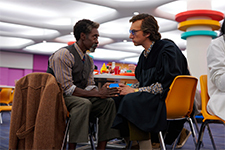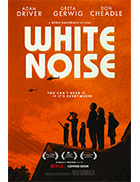White Noise
|  I have not read the 1985 Don DeLillo novel on which Noah Baumbach’s White Noise is based, but it is widely understood that the landmark postmodern work has long been considered “unfilmable.” Of course, that has been said about many difficult novels that have subsequently been turned into films, some of which have been quite good: Mary Harron’s 2000 adaptation of Bret Easton Ellis’s American Psycho, David Cronenberg’s 1991 adaptation of William Burroughs’s Naked Lunch, Danny Boyle’s 1996 adaptation of Irvine Welsh’s Trainspotting, and Mike Nichols’s 1971 adaptation of Joseph Heller’s Catch-22, to name a few. This is not the first time a filmmaker has tried to take on DeLillo: David Cronenberg adapted his 2003 novel Cosmopolis in 2012 and Benoît Jacquot adapted his 2001 novel The Body Artist as Never Ever in 2016, both with mixed results. The response to White Noise has been similar, with some viewers and critics immediately settling into its absurdist, ping-ponging narrative groove about the crushing weight of modern anxiety, while others decry it as a mess. And, speaking as someone who has no skin in the game as far as fidelity to the novels goes, Baumbach’s film is something of a mess, but in a great, enthralling, engaging kind of way. So many films telegraph their every move, letting us know from the outset exactly where they are going and how they are going to get there. One of the chief pleasures of White Noise is that it could go anywhere at any point (and it goes many, many unexpected places), but always in a way that feels connected to the other parts. There is a wide range of aesthetic approaches, tones, and dramatic versus comedic approaches throughout the film, but when the final credits roll over a massive musical number set inside an A&P grocery store, it all feels like it somehow makes sense, that Baumbach has found a through-line—however crooked it might be—and followed it. In the simplest (and therefore, least interesting) terms, White Noise is about a family. Set in the mid-1980s, we are introduced to Professor Jack Gladney (Adam Driver), the paterfamilias of a mixed brood cobbled together from his own children from several previous wives and children from his current wife, Babette (Greta Gerwig), who works as an exercise instructor. Jack is a pioneering scholar in the emerging field of Hitler Studies (even though he doesn’t know any German), which he teaches at the fictional College-on-the-Hill in a picturesque college town. He is the envy of his friend and colleague, Professor Murray Siskind (Don Cheadle), who wants to do for Elvis Presley what Jack has done for Hitler in the academy. The film is divided into three parts, each of which is introduced with a title card. The first part plays mainly as a satire of the absurdities of both competitive academia and harried nuclear family life. The humor is both subtle and broad, especially through the dialogue, which is highly stylized in its humorous rhetoric and incongruous asides and digressions (one of the best moments finds Murray pontificating about how great Babette’s curly mass of hair is). Baumbach writes and his cast delivers the dialogue with a perfectly straight face, which makes it all the more pleasurable and engaging, especially in the barely controlled chaos of the Gladney house, where half a dozen Altmanesque conversations are running simultaneously, each so interesting and funny that you want to go back and listen to each one individually. Driver is especially good at playing the self-serious, yet deeply insecure Jack, who we learn shares with Babette a deep and abiding fear of death, which Baumbach dramatizes in one deliriously effective sequence that is as scary and unnerving as anything in any recent horror film. That fear of death is put to the test in the film’s second part, where a massive train derailment leads to a chemical spill that produces a noxious black cloud (labeled “The Airborne Toxic Event”) that slowly moves over the town and forces a mass evacuation. Jack his family wind up in a refugee camp set up outside of town and run by the military, although prior to arrival there Jack is exposed to the cloud, which could prove to be lethal. The final third of the film centers on a mystery involving Babette and her use of Dylar, a fictional experimental drug. In direct counterpoint to the brightly lit, almost sitcom-like nature of the humor in the first past, this last third is defined by both visual darkness and intensifying interpersonal drama that involves lies, secrets, betrayal, and eventually attempted murder. However, the absurdist through-line remains just beneath the surface, poking out through the melodrama and intrigue from time to time before eventually rushing out and taking over in the film’s final sequences. It is a delicate, weird balancing act, and Baumbach, who has worked primarily in restricted dramatic space up until now, pulls it off with real aplomb. White Noise represents a major leap for Baumbach in terms of scope and scale, which is always at risk of swallowing him whole, but never does. And, while the films is very much reflective of its setting in the mid-1980s, it is hard not to feel the constant stab of contemporary anxieties in all its situations, whether those be environmental catastrophe, overreliance on prescription medication, familial breakdown, or culture wars over language and education. If the wardrobe, interior design, and hairstyles weren’t so prominently ’80s, you might think you were watching a film set in aftermath of the Trump years, distended as it is with cultural, political, and interpersonal fears that seem primed to explode at any minute. The fact that Baumbach has managed to make it all so ludicrously humorous and visually striking without losing the sting of its satirical bite is a miracle all its own. Copyright © 2023 James Kendrick Thoughts? E-mail James Kendrick All images copyright © Netflix |
Overall Rating: 


 (3.5)
(3.5)


